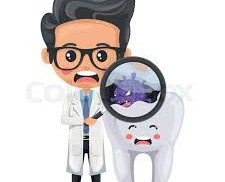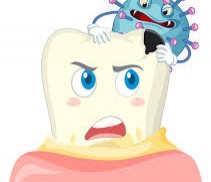Understanding Dental Infections and How to Treat Them Naturally


What Is a Dental Infection and Why Should You Care?
A dental infection is a condition where bacteria enter the teeth or gums, causing pain, swelling, and sometimes pus. But what makes it serious is that if left untreated, it can spread to other areas of the body and become dangerous.
Here’s what you need to know:
- It often starts from tooth decay, gum disease, or a cracked tooth.
- Bacteria multiply in the affected area, leading to pain or swelling.
- You may feel pressure, see swelling in the jaw, or notice a bad taste in your mouth.
- Infections that go untreated can affect the bones and even other organs.
Dental infections may seem small at first, but they can become a big problem quickly. That’s why understanding their early signs and how to manage them is important for everyone.
What Causes Dental Infections?
Dental infections happen when harmful bacteria enter through a tooth or gum opening. This can occur from daily habits or unexpected events.
Common causes include:
- Poor brushing or flossing habits
- Eating too many sugary foods and drinks
- A cracked or broken tooth that allows bacteria in Gum disease that creates pockets for bacteria to grow
- Dental procedures without proper hygiene afterward
Even a small cavity can lead to an infection if it’s not treated. Knowing what causes it helps in taking better care of your oral health.
Symptoms to Watch Out For
How do you know if you have a dental infection?
Sometimes the signs are obvious, and sometimes they’re not.
Pay attention to these symptoms:
- Throbbing or constant tooth pain
- Swollen gums or cheeks
- Fever or feeling tired
- Sensitivity to hot or cold foods
- A bad smell or taste in the mouth
- Trouble chewing or opening your mouth fully
These signs should not be ignored. If you notice any of them, it’s best to act quickly before it gets worse.
What Happens If You Do Not Treat It?
Some people wait too long or hope the problem goes away on its own. Unfortunately, dental infections do not heal without care.
Here’s what might happen:
- The infection can spread to nearby teeth and bones
- It can lead to jaw pain and even damage the facial structure
- In rare cases, it can spread to other organs and become life-threatening
- Chronic infections may cause long-term health problems
Treating the infection early is not just about saving your tooth—it’s about protecting your overall health.
Simple Ways to Prevent Dental Infections
You don’t need complicated routines to avoid dental infections. A few basic habits can make a big difference.
Try these helpful practices:
- Brush your teeth at least twice a day
- Floss daily to remove hidden food particles
- Rinse with clean water after meals
- Avoid too many sugary snacks
- Visit a dentist regularly for cleanings and checkups
Taking care of your mouth helps keep harmful bacteria away. Prevention is always easier than treatment.
How Wymox (Amoxicillin) Helps Treat Dental Infections
When a dental infection becomes serious, your doctor may suggest medicine to help clear the infection. One common and trusted treatment is Wymox (Amoxicillin), which is known to fight the bacteria causing the pain and swelling.
Benefits of using Wymox include:
- It helps reduce pain and swelling quickly
- It prevents the infection from spreading
- It supports healing alongside dental care
- It is usually well-tolerated and easy to take
- Wymox is not a replacement for dental treatment like fillings or cleanings, but it plays an important role in controlling the infection so your mouth can begin to heal.
Frequently Asked Question:
Can I just take Wymox and skip the dentist?
No. Wymox can help reduce the infection, but the cause of the problem—like a decayed tooth or gum issue—still needs to be fixed by a dentist. Always combine treatment with proper dental care.
Take Care of Your Smile Before It Hurts
Dental infections can start quietly but quickly become serious. By paying attention to your dental health and acting early, you can avoid pain, protect your teeth, and prevent future problems. Knowing the signs, maintaining daily hygiene, and seeking help when needed are the best ways to stay safe. And when necessary, medications like Wymox can offer trusted support in the healing process.
Aricle Post:Editorial Team of RXShop.md
(Updated at Jun 18 / 2025)